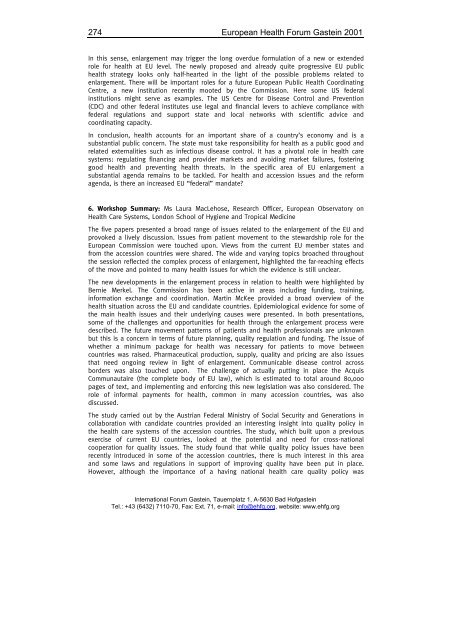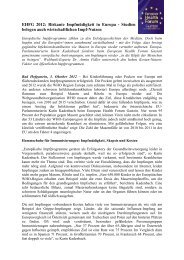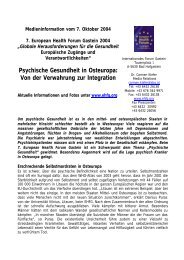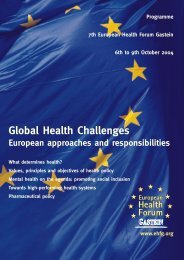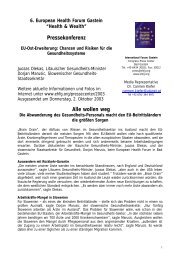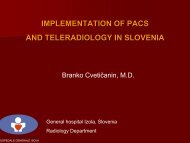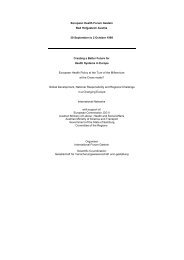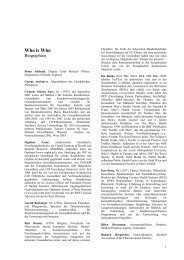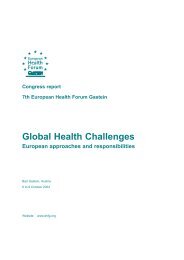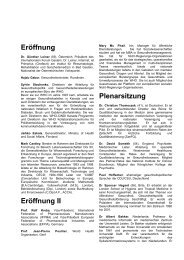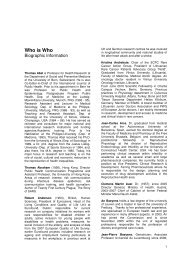Congress report - European Health Forum Gastein
Congress report - European Health Forum Gastein
Congress report - European Health Forum Gastein
Create successful ePaper yourself
Turn your PDF publications into a flip-book with our unique Google optimized e-Paper software.
274<br />
<strong>European</strong> <strong>Health</strong> <strong>Forum</strong> <strong>Gastein</strong> 2001<br />
In this sense, enlargement may trigger the long overdue formulation of a new or extended<br />
role for health at EU level. The newly proposed and already quite progressive EU public<br />
health strategy looks only half-hearted in the light of the possible problems related to<br />
enlargement. There will be important roles for a future <strong>European</strong> Public <strong>Health</strong> Coordinating<br />
Centre, a new institution recently mooted by the Commission. Here some US federal<br />
institutions might serve as examples. The US Centre for Disease Control and Prevention<br />
(CDC) and other federal institutes use legal and financial levers to achieve compliance with<br />
federal regulations and support state and local networks with scientific advice and<br />
coordinating capacity.<br />
In conclusion, health accounts for an important share of a country’s economy and is a<br />
substantial public concern. The state must take responsibility for health as a public good and<br />
related externalities such as infectious disease control. It has a pivotal role in health care<br />
systems: regulating financing and provider markets and avoiding market failures, fostering<br />
good health and preventing health threats. In the specific area of EU enlargement a<br />
substantial agenda remains to be tackled. For health and accession issues and the reform<br />
agenda, is there an increased EU “federal” mandate?<br />
6. Workshop Summary: Ms Laura MacLehose, Research Officer, <strong>European</strong> Observatory on<br />
<strong>Health</strong> Care Systems, London School of Hygiene and Tropical Medicine<br />
The five papers presented a broad range of issues related to the enlargement of the EU and<br />
provoked a lively discussion. Issues from patient movement to the stewardship role for the<br />
<strong>European</strong> Commission were touched upon. Views from the current EU member states and<br />
from the accession countries were shared. The wide and varying topics broached throughout<br />
the session reflected the complex process of enlargement, highlighted the far-reaching effects<br />
of the move and pointed to many health issues for which the evidence is still unclear.<br />
The new developments in the enlargement process in relation to health were highlighted by<br />
Bernie Merkel. The Commission has been active in areas including funding, training,<br />
information exchange and coordination. Martin McKee provided a broad overview of the<br />
health situation across the EU and candidate countries. Epidemiological evidence for some of<br />
the main health issues and their underlying causes were presented. In both presentations,<br />
some of the challenges and opportunities for health through the enlargement process were<br />
described. The future movement patterns of patients and health professionals are unknown<br />
but this is a concern in terms of future planning, quality regulation and funding. The issue of<br />
whether a minimum package for health was necessary for patients to move between<br />
countries was raised. Pharmaceutical production, supply, quality and pricing are also issues<br />
that need ongoing review in light of enlargement. Communicable disease control across<br />
borders was also touched upon. The challenge of actually putting in place the Acquis<br />
Communautaire (the complete body of EU law), which is estimated to total around 80,000<br />
pages of text, and implementing and enforcing this new legislation was also considered. The<br />
role of informal payments for health, common in many accession countries, was also<br />
discussed.<br />
The study carried out by the Austrian Federal Ministry of Social Security and Generations in<br />
collaboration with candidate countries provided an interesting insight into quality policy in<br />
the health care systems of the accession countries. The study, which built upon a previous<br />
exercise of current EU countries, looked at the potential and need for cross-national<br />
cooperation for quality issues. The study found that while quality policy issues have been<br />
recently introduced in some of the accession countries, there is much interest in this area<br />
and some laws and regulations in support of improving quality have been put in place.<br />
However, although the importance of a having national health care quality policy was<br />
International <strong>Forum</strong> <strong>Gastein</strong>, Tauernplatz 1, A-5630 Bad Hofgastein<br />
Tel.: +43 (6432) 7110-70, Fax: Ext. 71, e-mail: info@ehfg.org, website: www.ehfg.org


